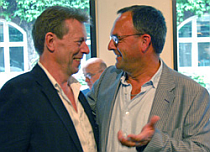


Ib Bondebjerg: A Poetics for the Documentary

A poetics for the Documentary – basic genres and formats
Ib Bondebjerg
I think it is a very valuable endeavour Opstrup (ed.: Mikael Opstrup: “The documentary Narrative / Den dokumentariske fortælling”, 9.10.08 on this site, written in Danish and English. Search on “opstrup” at the left column) has embarked on trying to define what is specific for a documentary narrative and comparing it with documentary (TV)programs and the fiction film narrative. To see the documentary project as a working with contradictions between reality and narrating reality is certainly an aspect worth noting…
Photo: Ib Bondejerg right.. Henning Camre left
A Poetics for the Documentary – basic genres and formats
Ib Bondebjerg
I think it is a very valuable endeavour Opstrup has embarked on trying to define what is specific for a documentary narrative and comparing it with documentary (TV)programs and the fiction film narrative. To see the documentary project as a working with contradictions between reality and narrating reality is certainly an aspect worth noting.
However, I think Opstrup misses some very important aspects of documentary poetics and aesthetics by not taking into consideration that it is impossible to talk about the fiction film, the documentary program and the documentary film in the singular. Both documentary films and fiction films have very different genres and forms of narration. In the case of documentary forms these cut across TV-programs and documentary films. To construct a basic difference between documentary TV-programs and documentary films is therefore problematic.
In my recent book “Virkelighedensfortællinger. Den danske tv-dokumentarismes historie” (Samfundslitteratur, 2008) I try to define the four basic formats and genres in documentary, and in doing so I continue the work of international scholars like Bill Nichols, Carl Plantinga and John Corner. In my coming book “Virkelighedsbilleder. Den moderne danske dokumentarfilm”, I will continue with a historical analysis of how the Danish documentary film made through Statens Film Central and later DFI have used the same fomats, but in different ways and with different accents.
I my view there are four basic genres and modes of narration in documentary films and tv-programs, each with a distinctly diferent relation to reality and the rhetorical, narrative and aesthetic way of describing reality:
1. The authoritative documentary is informational and investigative and uses a strong and explicit rethorical voice in narrating reality. But it also often uses narrative devices and dramaturgic structures.The authoritative voice can vary from the more objective and didactic to the more critical.
2. The observational documentary takes an ethnographic and open approach to reality and wants to show reality as it unfolds in a given milieu or setting. The voice of the observational documentary is part of the reality being shown. But the organisation and structure of the observational film or program can be narrative in many ways. But often it uses a multi-plot narative unfolding in a mosaic and thematic structure.
3. The dramatised documentary is a complex and often contested and controversial documentary form because it takes a clearly hypothetical approach to reality. When Peter Watkins, for instance made “Wargame” he clearly used a journalistic format, a kind of reportage of an ‘as if event’, namely what would happen if London was hit by an atomic bomb. But this was a hypothetical reportage on a hypothetical event, but based on careful research of the official policy documents on how to react in such an event. Another example is Morten Hartz Kaplers “AFR” mixing factual and fictional elements in a drama-documentary.
4. The poetic reflexive documentary on the other hand is characterized by a personal and asthetic approach to reality. Reality is filtered through an aesthetic principle that becomes dominant or points towards the way reality is portrayed and reflected. When Jytte Rex for instance wants to tell us about European culture she does that in a staggering and beautiful montage of images and forms in “Floden”. And Jørgen Leth is famous for his minimalistic and staged portraits of reality.
The important thing when discussing documentary narration and aesthetics is not to try to distinquish documentary film from fictional on a formal and aesthetic level or to make a sharp distinction between documentary (TV) programs and documentary films. The important thing is to define the aesthtic complexity of all documentary formats, to allow for difference and variation in the way documentary productions are done.To define four very basic formats allow us to start seeing this complexity in both film and tv. But it is also important to realize that when we look at concrete historical periods of documentary we will often see hybrids between de basic formats: the poetic authoritative documentary, the observational-poetic documentary etc. Many documentaries take elements from different basic formats. This is another way of defining the complexity and contradictions Opstrups defines in his poetics of the documentary.
Ib Bondebjerg, Professor Deputy Chair of Department & Head of Section Department of Media, Cognition and Communication Section of Film and Media Studies University of Copenhagen, Southern Campus Njalsgade 80, 2300 Copenhagen S Phone: +45 35328102 Fax: +45 35328110 Mobile: +45 60241164 Mail:
Web: http://www.filmkommentaren.dk/aviva/
Director Centre for Modern European Studies (CEMES)* University of Copenhagen Njalsgade 80, 2300 Copenhagen S Denmark
Web: www.cemes.ku.dk Mail: mes@hum.ku.dk
Photo: Ib Bondejerg right.. Henning Camre left